Iran Considers Criminalizing Starlink Over Military Concerns
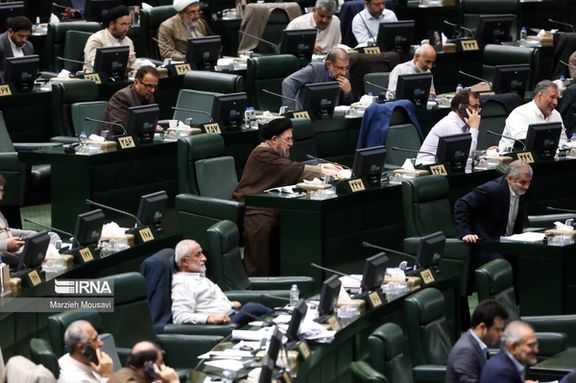
Iran’s parliament has published a report that raises concerns about satellite internet technology, proposing criminalizing US-based Starlink in the Islamic Republic.

Iran’s parliament has published a report that raises concerns about satellite internet technology, proposing criminalizing US-based Starlink in the Islamic Republic.
The report, titled "Analysis of the Status of Low-Orbit Satellite Internet Services in Iran," delves into the specific case of Starlink in Iran and worldwide, saying buying and selling the equipment in the country must be banned.
In the 30-page report, the authors present the governmental perspective on controlling satellite internet technology, considering both its current and future implications. One of the most important aspects of the report is the suggestion to use punitive measures and criminal policies to minimize perceived "threats" and to adopt innovation "without compromising national sovereignty."
The report describes Starlink, a US-based company under SpaceX, as a project with “military objectives,” posing potential threats to the national security of other countries.
One of the long-term scenarios outlined in the report for controlling access to satellite internet services involves the creation of a consortium with China and Russia, key allies of the regime.
In the last twenty years, Iran has enforced severe censorship policies on internet access, curtailing the freedom of its citizens to access information. The measures include the blocking of both foreign and domestic websites. Nonetheless, individuals have found ways to bypass these constraints through the widespread adoption of Virtual Private Networks (VPNs).
Following the announcement of US sanctions exemptions for Starlink, access to the satellite internet services of this company became available to residents of Iran last October. Elon Musk, the CEO of SpaceX, later confirmed that around 100 Starlink terminals had become operational in Iran.
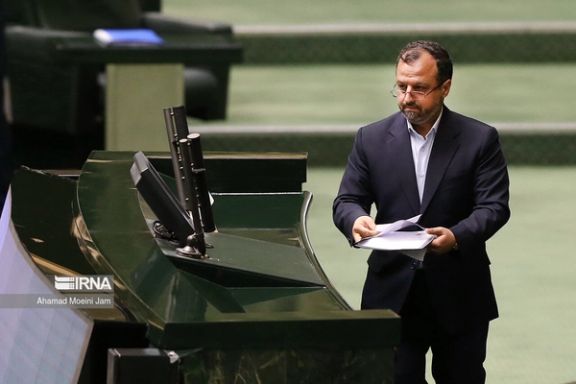
The Iranian Ministry of Economy has provided a formal response to recent speculations regarding a potential shift in Iran's stance towards the Financial Action Task Force (FATF).
The ministry's statement on Sunday states, "The Islamic Republic of Iran's policy concerning the FATF remains unaltered."
Any modifications to this approach, the statement clarifies, must be subjected to scrutiny by the appropriate authorities.
The FATF, or the Financial Action Task Force, is an initiative established by G-7 nations to combat money laundering and the financing of terrorism. The recent resurgence of discussions regarding Iran's approach to FATF coincided with the international scrutiny that followed a violent attack by Hamas on Israel, leading to criticism of Iran's support for the organization.
On Saturday, a prominent politician in Tehran hinted that President Ebrahim Raisi's administration might consider revisiting four bills related to Iran's potential adherence to FATF conventions. The four bills have lingered in Iran's legislative process since 2017, facing opposition, especially from hardliners. They encompass measures for joining the convention against organized crime, amending the anti-money laundering law, accepting the convention against financial support for terrorism, and amending the law against financial support for terrorism.
The statement concludes by making a plea to the media, urging them to approach the matter with a “technical perspective, devoid of political bias.”
Opposition to the bills from hardliners has been based on the argument that their acceptance would constrain Iran from providing financial support to groups like Hamas, Islamic Jihad, and Hezbollah, which are designated as terrorist organizations by numerous countries.

People and media in Iran have been shocked by the stabbing death of director Dariush Mehrjui and his wife, Vahideh Mohammadifar, in their home near Tehran.
Local law enforcement authorities are currently investigating the circumstances surrounding the deaths, with the motive for the killings yet to be determined.
On Saturday evening, the police said the pair were stabbed to death in the neck and body in a gruesome incident involving multiple individuals.
Mona Mehrjui, the daughter of the director, found their bodies when she visited her father's home on Saturday night in Karaj, approximately 30 kilometers west of the capital, Tehran.
Mohammadifar had recently reported a burglary outside their home and direct threats from an individual brandishing a knife. She had also contacted the police regarding her concerns.
Mehrjui's notable stance against censorship and his vocal opposition to security measures imposed on Iranian cinema were well-documented. In a video message addressing the cancellation of the screening of his film La Minor, he asserted, "I can no longer endure this. I will mobilize and, alongside my team, stage a protest at the Ministry of Culture. I am ready to fight."
He was a renowned figure in Iranian cinema and was widely recognized for his contributions as a filmmaker and screenwriter. He was a pivotal figure in the Iranian New Wave cinema and was celebrated for his works, including The Cow, Mr. Naive, The Postman, The Cycle, Hamoun, Leila, and Pari.

As the war against Hamas rages on in Israel, Iran continued to leverage its proxies in Beirut this weekend while Israel prepared for a possible ground assault on Gaza.
While the Iranian foreign minister met with its proxy Hezbollah in Beirut, the Israeli national security adviser Tzachi Hanegbi warned the Lebanese militant group not to start a war on a second front, threatening the "destruction of Lebanon" if it did.
The regime’s UN representatives wrote on X further warnings against the Jewish state, calling the attack on Gaza a “genocide”, in spite of October 7’s attack on Israeli soil being the most deadly day for Jews since the Holocaust as militant slaughtered civilians in towns across Israel's south.
“If the Israeli apartheid’s war crimes and genocide are not halted immediately, the situation could spiral out of control and ricochet far-reaching consequences — the responsibility of which lies with the UN, the Security Council & the states steering the Council toward a dead end,” it stated.
On a visit to Lebanon as part of a regional tour this weekend, foreign minister Hossein Amir-Abdollahian claimed Hezbollah, its biggest proxy positioned on Israel’s northern border, had scenarios “designed” and “prepared” in case the blitz on Gaza does not stop.
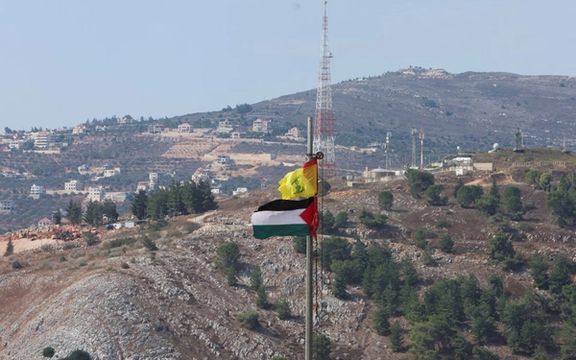
In strong words, he warned that if Israel did not stop its attacks on Gaza which have so far taken out key military figures, “their [Hezbollah’s] finger is on the trigger to shoot”, putting it right in the middle of the conflict it continues to deny involvement in.
Amir-Abdollahian added: “I know about the scenarios that Hezbollah has put in place. Any step the resistance [Hezbollah] will take will cause a huge earthquake in the Zionist entity.
“I want to warn the war criminals and those who support this entity before it’s too late to stop the crimes against civilians in Gaza, because it might be too late in few hours.”
As thousands of Palestinians are dying amidst the war, Hamas continues to use its citizens as shields across the enclave, with footage released by analysts showing the terror group blocking safe passage for Gaza’s heading south after warnings from the IDF of imminent air strikes on military targets.
On Sunday, a senior Israeli official claimed Iran is trying to open a second war front by deploying weapons in or through Syria. Responding to a post of the X social-media platform that posited such a scenario, Joshua Zarka, head of strategic affairs for Israel's Foreign Ministry, said the country is determined to prevent a multi-fronted assault.
It comes in the wake of attacks on Aleppo and Damascus airports last week. While Israel does not comment on such operations, it is widely believed it was aimed to prevent the transfer of Iranian weapons to its proxies in Syria.
While nations including the US has said there are no clear signs that Iran is behind the war, the State Department released information claiming the regime funds Hamas with at least $100 million per year, in addition to operational and weapons support.
In 2019, the US Department of the Treasury’s Office of Foreign Assets Control (OFAC), in partnership with the Sultanate of Oman, designated financial facilitators responsible for moving tens of millions of dollars between Iran’s Islamic Revolutionary Guard Corps-Qods Force (IRGC-QF) and HAMAS’s operational arm, the Izz-Al-Din Al-Qassam Brigades in Gaza.
Over recent months, a stream of meetings between Tehran and its Palestinian proxies in addition to Hezbollah in Lebanon have taken place across the region.
Both President Ebrahim Raisi and Supreme Leader Ali Khamenei have both come out in praising Operation Al Aqsa Storm which last week saw hundreds of Hamas militants enter Israel by land, sea and air on Saturday morning, accompanied by a bombardment of thousands of rockets.
Last week, Raisi said: "Their resistance in this glorious operation is exemplary. The determination of the young Palestinians has created a great epic and demonstrated that oppressing a nation, displacing people, and occupying their land may last for a while, but it infuriates the oppressed people, and they are no longer willing to endure the oppression. I hope God helps the fighters in liberating their land.”
The US and UK have moved warships to the region and have vowed unequivocal military support to Israel as it fights against the terror group, deterring further involvement from Iran and its proxies.
Last week in talks with Jewish community leaders, Biden said: "We moved the US carrier fleet to the eastern Mediterranean and we are sending more fighter jets to that region, and made it clear to the Iranians: Be careful.”
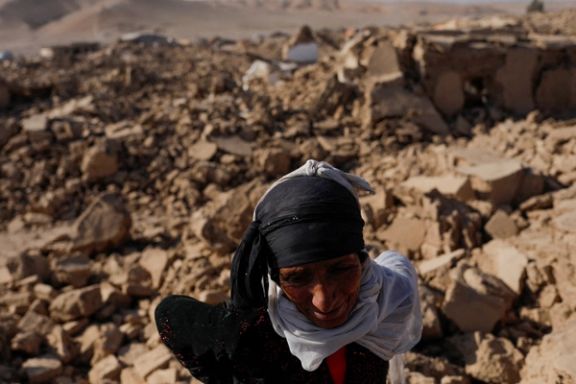
A powerful earthquake registering a magnitude of 6.3 struck western Afghanistan on Sunday, after a series of tremors this week brought wide-spread destruction.
It comes a week after a series of intense seismic events and aftershocks that claimed the lives of thousands and razed entire villages in the same region.
The quake was also felt in eastern regions of Iran including the religious city of Mashhahd.
According to the United States Geological Survey (USGS), the epicenter of the earthquake was approximately 34 kilometers beyond Herat, the provincial capital, and reached a depth of eight kilometers below the surface. The European-Mediterranean Seismological Centre (EMSC) reported a magnitude of 6.5 on the Richter scale.
As of midday local time there were no official reports about casualties and damage.
The earthquakes that occurred on October 7 had catastrophic consequences, completely decimating villages in Herat, marking one of the most devastating seismic events in the nation's recent history.
Tragically, more than 90% of the individuals who lost their lives were women and children, according to UN officials.
Taliban officials said that the earthquakes last week claimed the lives of over 2,000 people across the province. The epicenter was situated in the Zenda Jan district, where UN data indicates that 1,294 people lost their lives, and 1,688 sustained injuries.
The 6.3-magnitude quake demolished hundreds of mud-brick homes that were ill-equipped to withstand such powerful tremors. Schools, health clinics, and other vital village facilities also crumbled.
Survivors grapple with the profound loss of multiple family members, and in many places, the number of volunteers who have arrived to sift through the debris and excavate mass graves now exceeds the remaining residents.
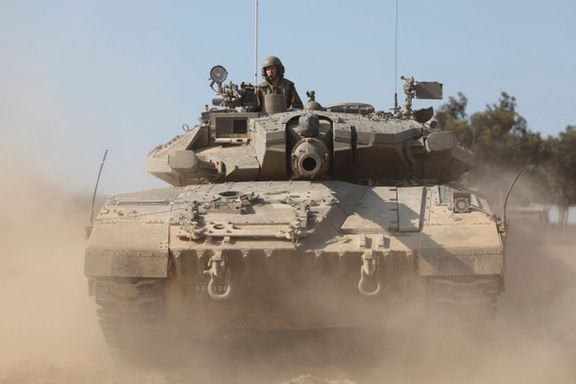
A senior conservative Iranian politician has said that if Israel launches a ground offensive in Gaza, Iran’s other proxy forces should join the war.
Iranian media on Sunday quoted Ali Motahari, former deputy speaker of the Islamic Republic’s parliament, who often appears as a voice of moderation on some issues, called the Lebanese Hezbollah and Syria “Iran’s forces”.
He stated that “We should not be indifferent until the operation starts,” and added that Iran’s allies should “play a deterrent role.”
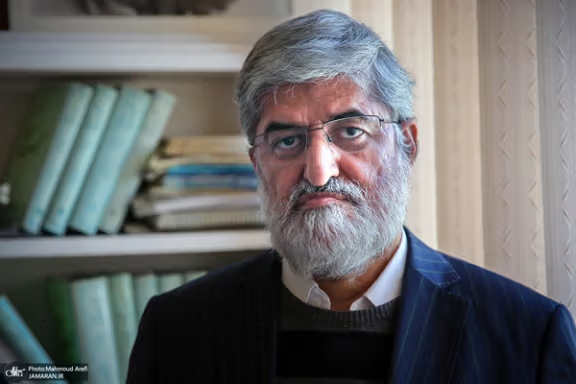
Motahari called for “all the means prepared in past years should be deployed. Naturally, such plans should already exist. Mr. Amir-Abdollahian’s [foreign minister] trip to Syria and Lebanon showed that such coordination is taking place. He did mention that if a ground attack takes place against Gaza, others in the resistance front will become active.”
Hossein Amir-Abdollahian who visited Qatar on Saturday met Hamas chief Ismail Haniyeh, leading to calls by many observers for the United States to push Qatar to distance itself from Palestinian militants.
A senior Israeli official accused Iran on Sunday of trying to open a second war front by deploying weapons in or through Syria as Israel steps up its counter-offensive in Gaza to the south.
Responding to a post of the X social-media platform that posited such a scenario, Joshua Zarka, head of strategic affairs for Israel's Foreign Ministry, said: "They (Iranians) are."
The original post also said "the Israelis are determined to prevent" such developments. To that, Zarka responded" "We are."
Syria accused Israel of carrying out strikes against Damascus and Aleppo airports last week.